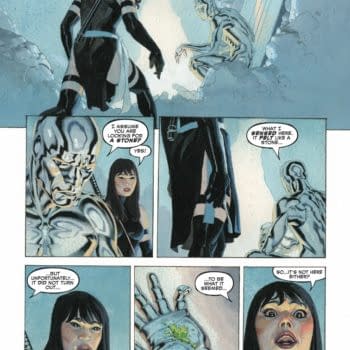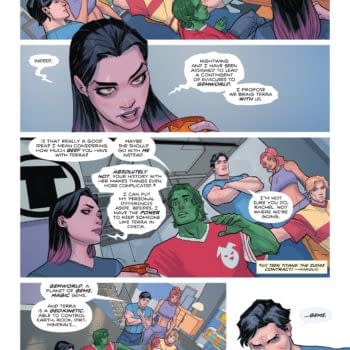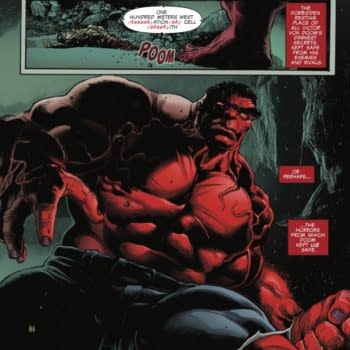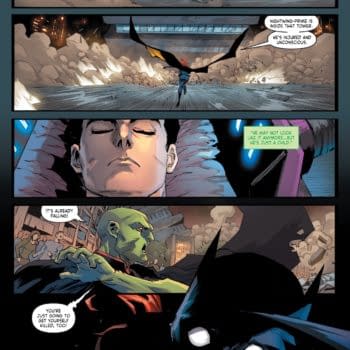Posted in: Fox, Sports, TV, USA Network, WWE | Tagged: bleeding cool, cable, comic books, Comics, dc, dc comics, fox, marvel, Marvel Comics, NXT, nxt uk, pro wrestling, Raw, Smackdown, streaming, television, Triple H, tv, usa, Vince McMahon, wrestling, wwe
WWE is Making the Same Mistake That Marvel and DC Did
The big news in the wrestling world this week is a creative shakeup at WWE that has seen Paul Heyman removed as creative director of WWE Monday Night Raw and the entire creative team of both shows consolidated under Bruce Pritchard, who was previously running just Smackdown. More alarmingly, a report from the most recent issue of Dave Meltzer's Wrestling Observer Newsletter says that Vince McMahon has abandoned all recent attempts at building long-term growth for WWE in favor of concentrating on short-term solutions to declining interest in the WWE product which was not created by, but has been exacerbated by, the coronavirus pandemic. The report notes:
It's said by those close to the situation that once COVID-19 started that McMahon's mentality changed about everything. Previously, the mentality was all about the future. The XFL was a long-term play. Raw under Heyman was a long-term play. Expanding NXT into Europe and Japan, and opening up other markets under Paul Levesque was a long-term play. Now the mentality is to worry about what you have and think about now, even though the company is going to be more profitable this year and next than probably any time in its existence.

McMahon's new outlook is worrying because, despite what he may think, he is not applying a short-term solution to a short-term problem. The coronavirus pandemic has exposed weaknesses in the way WWE has been run for several decades, and though it's made a solution more urgent, it doesn't change the fact that the solution needs to be a long-term one or WWE will come out of the pandemic era in even worse shape than it went into it. But WWE's reliance on short-term solutions to long term problems is very familiar if you've been a reader of my reporting on the comic book industry over the last decade. In fact, WWE has been pursuing and is now doubling down on a strategy that sacrifices the future for profits in the present.
How WWE Struggles Parallel Those of Marvel and DC
For the past few decades, the comic book industry has relied heavily on short-term profits over any kind of long-term plan to build interest in their product and grow their readership. At the risk of drastic oversimplification, for those unfamiliar with the comics business, the bulk of the sales for what most people think of as comic books, superhero comics from Marvel and DC, comes from something called the Direct Market, which is a system of retailers who purchase the stock of comics from Marvel, DC, and other publishers and, in most cases, then owns the stock. Those retailers must then sell the stock to customers to make a profit, though Marvel and DC have already made their profits once the retailers purchase the books.
The problem is that Direct Market retailers have never really had a good way to bring new customers into their shops in the kind of numbers that mattered. Since the collapse of the newsstand comics market in the 1980s and 1990s, specialty comic book stores have been the only place to purchase single-issue comic books. That was fine at first, as there was enough awareness and popularity of comics from people who had been introduced to them on the newsstand for everyone to make money for a while.
However, several decades later, there are no kids who have been introduced to comics because they got their parents to buy them for them after seeing them in a supermarket, pharmacy, or convenience store. As a result, the readership of superhero comic books is mainly an aging fanbase of hardcore fans and collectors, even as movies based on the characters are more popular than ever, and even as the medium of comics is also doing great in the form of middle-grade and teen graphic novels created outside of the superhero industry and sold in bookstores as well as independent webcomics viewed on platforms like Webtoon.
Because there's no feeder system to direct new readers to comic book stores, Marvel and DC have consistently raised the prices of comics over the last few decades, while simultaneously drawing out the storylines so that a story that would once be told in a one or two issues for a dollar each is now told across five or six issues for four or five dollars each. At the same time, Marvel and DC (but Marvel in particular) have flooded the market with multiple comic books featuring the same characters, run constant super-mega-crossover events which promise impactful, universe-changing storyline developments which rarely deliver, and engaged in various other gimmicky methods to convince retailers to purchase more and more comics to sell to the same customers. Those retailers are expected to sell these comics to the same fanbase, with the idea that someone who reads X-Men will buy eight monthly X-Men comics, some of them shipped twice per month, as well as any super-mega-crossover events that feature the X-Men out of habit, obligation, or a neurotic fear of experiencing a break in a story they've been reading and collecting for decades.
This resulted in circular decline whereby fewer readers want to purchase comics because the value of story to dollars is constantly decreasing, which causes Marvel and DC to decrease the value even more by raising prices and spreading content even thinner to continue to make a profit, which in turn perpetuates the decline in readership. This all came to a head with the coronavirus pandemic when Diamond, the company which up until a few weeks ago held a monopoly on distributing comic books to Direct Market retailers, shut down shipping in March for about two months.
All of a sudden, comic book shops which were operating on very tight margins already found themselves in danger of going under, which in turn seriously threatened all of the smaller publishers who were also operating under tight margins but might now have even fewer locations in which to sell their comics. Making matters worse, comic book readers, many of which were in the habit of visiting retailers on a weekly basis to pick up the latest books, got to experience two months of not doing it. With the habit broken, and life going on without a fifty dollar stack of new comics every Wednesday, how many will come back and willingly spend that money again on a product they may have learned wasn't as essential as they thought?
Marvel and DC will be fine as both are owned by major corporations, Disney and Warner Bros respectively. But it's possible that the coronavirus pandemic's two-month interruption of regular comic book shipping has killed the Direct Market model of comic book sales and maybe even the single-issue superhero comic book format as we know it. And all of that is the result of short-term thinking at the expense of long-term growth, something I've been talking about for about ten years in my career reporting on comics, while people invested in the system buried their heads in the sand and held up the direct market system as the envy of the publishing world for its ability to make profits for comic book publishers even as periodical publishing overall declined in the digital age.
If you're seeing parallels between what the comics industry has gone through over the past two decades and over the past few months and what's been going on in WWE over those same time periods, you're not alone. Like Marvel or DC, WWE has plenty of money coming in to keep it afloat for years to come, but at what point will networks like Fox or USA start to regret the amount of money they're paying WWE for television rights and look to make much cheaper deals or cancel the shows completely?
That may seem like a short-term problem, if you're McMahon, that can be solved by somehow squeezing more interest and patronage from the remaining hardcore WWE audience. But it's really a long-term problem of that audience shrinking rather than growing, and a lack of patience in building new stars out of the current generation of wrestlers and growing the audience is only going to exacerbate that problem in the long term.
















